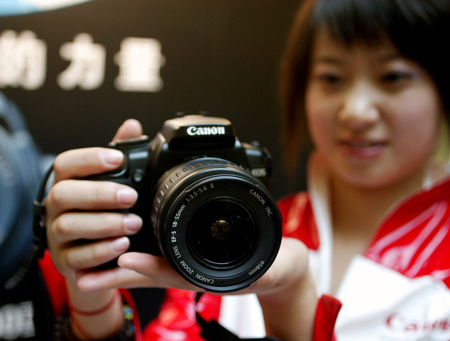
|
BIZCHINA> Top Biz News
 |
|
Canon relying on nation to get its flash back, says Yoshioka
By Wang Xing (China Daily)
Updated: 2009-04-22 08:01
 Executives at technology companies are working hard to stop revenues from declining sharply as consumers show less willingness to spend on digital gadgets amid the global economic slowdown. For Tatsuo Yoshioka, vice-president of Canon China, the mission this year is tough: to sell one-fifth more digital cameras in China where the market as a whole is expected to shrink by 3 to 4 percent. The financial crisis cut Canon's net profit by 37 percent last year. Shrinking profit margins, a stronger yen and plunging demand in mature markets have certainly not helped the world's largest camera maker.
"In every crisis there are some unprecedented hidden opportunities and the vital thing is how we can discover that faster than our competitors," said Yoshioka. "According to our estimates, there are still 70 million Chinese families that plan to purchase digital cameras. So, we think there is still a huge space to grow." Canon is the biggest player in the domestic digital camera market, with a nearly 30 percent share. It is followed by Sony, Samsung and Nikon, according to domestic research firm, CCID consulting. During the past few years, the company has recorded nearly 30 percent growth in the country, making China Canon's third largest market after the United States and Japan. China has long been believed to be the "safe harbor" for many multinationals suffering from a plunge in global technology spending. But the evidence is growing that the harbor is no longer as safe as earlier estimated. According to research firm GFK, digital camera shipments in China are predicted to decrease by 3 to 4 percent this year due to the ongoing economic downturn. This is in sharp contrast to the 13 percent growth seen last year, during which period digital camera shipments reached 110 million in the country. GFK said the market may not resume growth for a further two to three years as digital camera penetration in large Chinese cities, the major market engine in the country, is nearing saturation point after years of rapid growth. "The digital camera, by nature, is a kind of entertainment product, which people will buy only when they have disposable income," said M K Wong, client service manager at GFK. "So, it will be very difficult to grow this year under the current market environment." However, Yoshioka said he was confident that Canon could still grow by 20 percent in China although the market growth itself is slowing. "Chinese consumers may become more prudent in making purchasing decisions at bad times but they will not stop buying digital products," Yoshioka said. As part of its efforts, Canon released 17 new digital cameras in the domestic market mid-February. The company also launched a marketing campaign called "Hello, Color" and invested a great deal of money in setting up huge advertising posters in the metro systems in Beijing, Shanghai and Guangzhou to stimulate consumer demand. "We do not plan to reduce our marketing spending in China this year because we regard China as the only country that can withstand the current global economic slowdown," said Yoshioka. The vice-president pointed out that Canon plans to accelerate the expansion of its sales network to third- and fourth-tier Chinese cities, where digital camera penetration was lower and the market less impacted by the crisis. In fact, Canon is not the only firm that is eyeing China to get through the current difficulties. Some Chinese competitors are also gearing up to challenge the Japanese company's dominance. A manager at Beijing Huaqi Information Digital Technology, one of China's largest consumer electronics product vendors, said his company plans to take up to 5 percent market share in the local digital camera market this year, surpassing companies like Fujifilm, Panasonic and Kodak. "The Japanese companies need to spend a huge amount in operations and marketing their products in China. We can release the same quality product at a much lower price," said the manager, who declined to be named. He said his company plans to aggressively expand into third- and fourth-tier cities this year where consumers are more sensitive to low pricing. Yoshioka, for his part, said Canon would be flexible in pricing but emphasized that Canon will not take part in any price war.
(For more biz stories, please visit Industries)
|
|||||